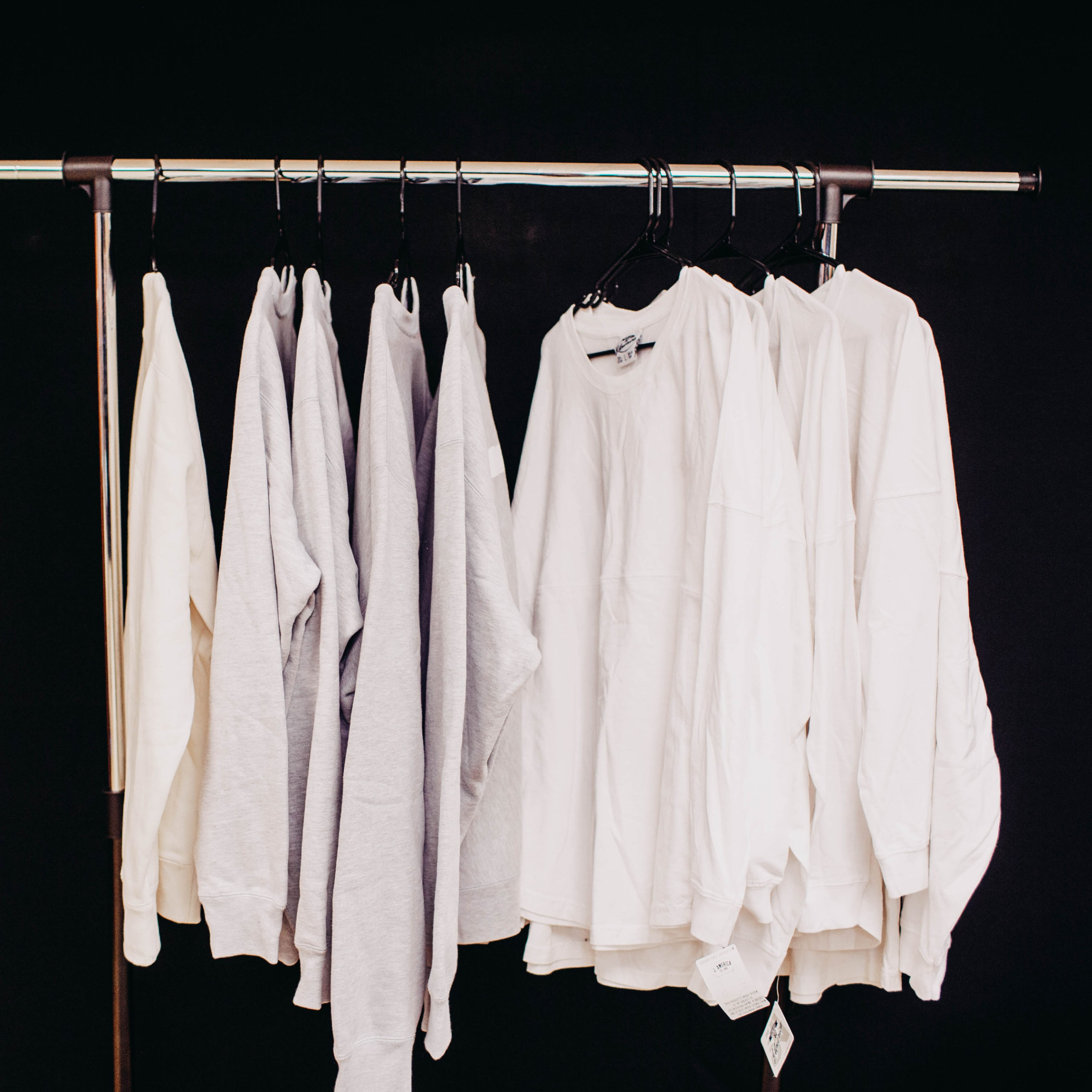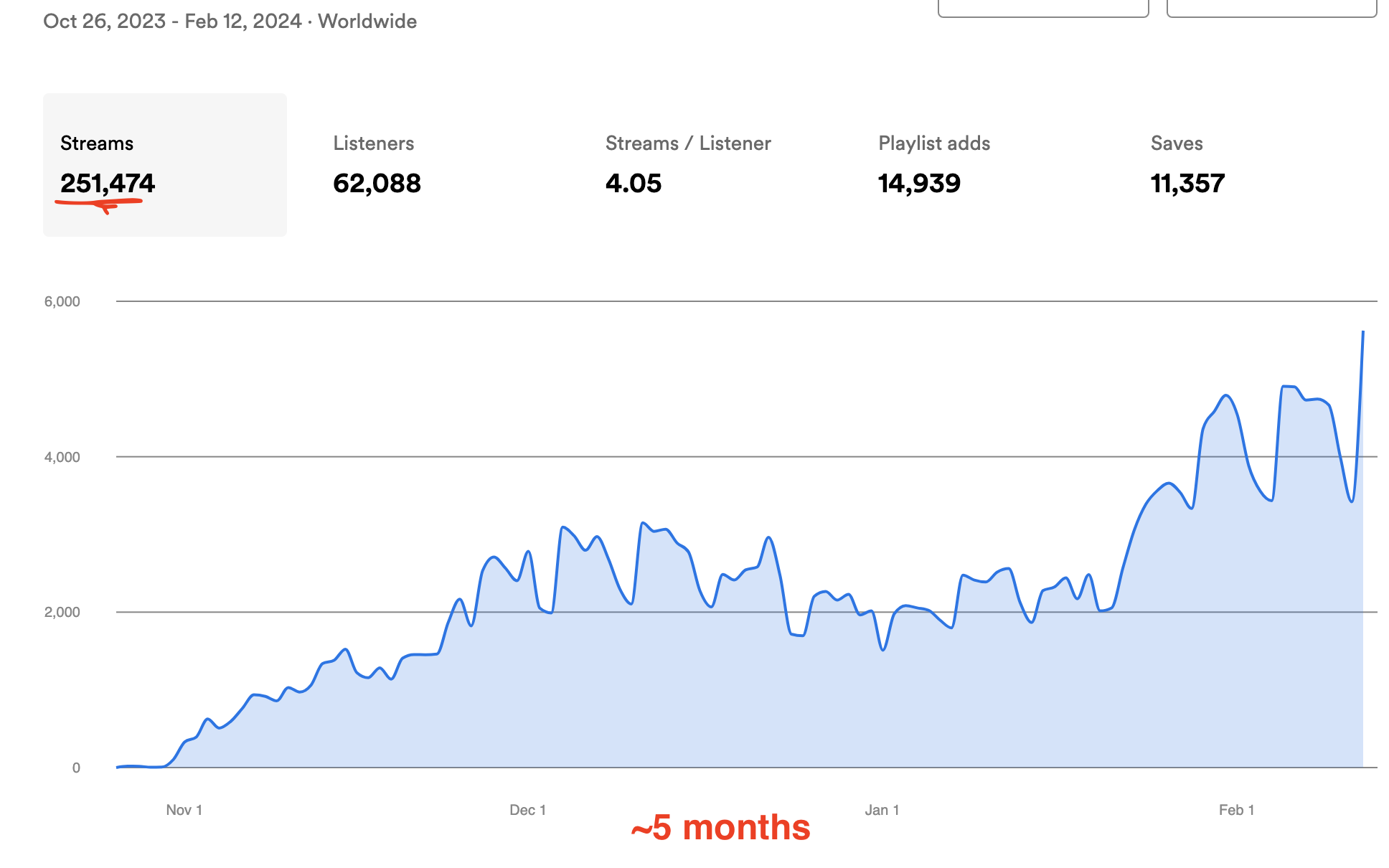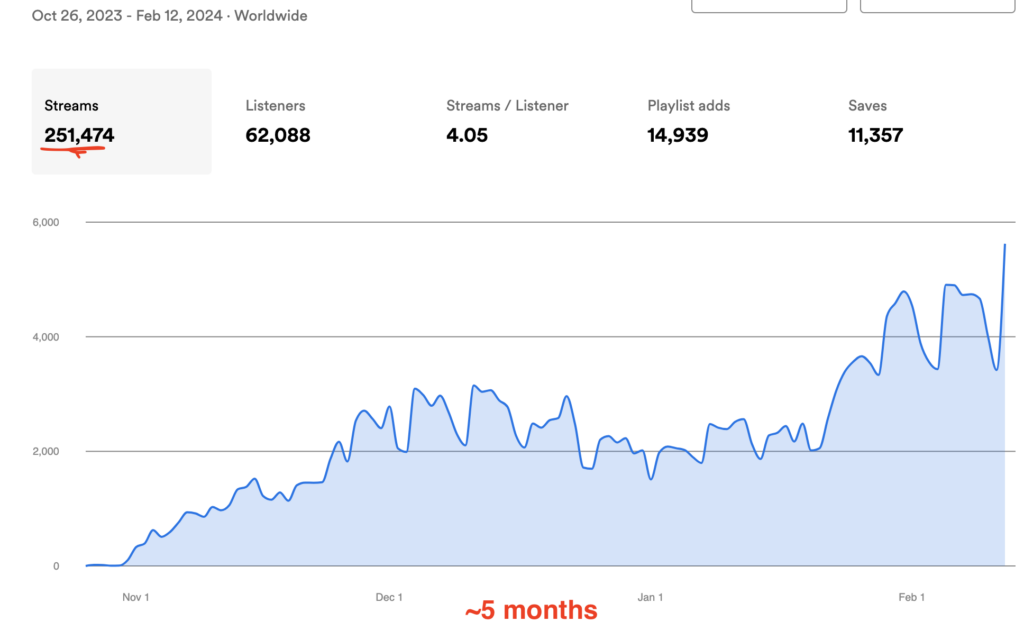Here are the best merchandise services for musicians:
Want the details on each? Keep reading.
Us independent musicians have got to do everything ourselves.
As if it’s not tiring and time-consuming enough being the musically creative geniuses that we are, we have to double down and be our own merch designers and sellers as well. It’s a hard knock life.
Of course, “merch” is a vague term. Some artists only sell CDs. Others hand-draw lyric art and sell it. Many sell t-shirts and sweatshirts. There are even a select few who really fit the mug esthetic. I’m looking at you, Drew Holcomb.
But whoever you are, if you’re an artist, merch is undeniably a revenue stream you should capitalize on. Across the board, merch sales make up somewhere between 10-35% of an artist’s income. That’s a noticeable chunk, and with streaming on the rise (and streaming royalties sadly not on the rise yet), one that indie artists can’t afford to miss out on.
There’s one main problem, though.
Being your own retailer isn’t ideal.
It happens to all of us when we start out: we gear up for a single or album release, and we think I should really make some merch to go with this. So we spend a few hours designing the perfect t-shirt and hat combo; not too busy, with the dopest font we could find. Then we go online, order 100 of each, and ten weeks later, we still have 43 of each left over, and they’re all smalls and double-XLs. A year later, we’re still throwing them into bundle sales and Christmas gifts left and right.
Unless our designs are way above average on the cool spectrum, or we have a ton of friends who are more than willing to support us in every way possible, we need some sort of solution to the cycle of buying too much merch, not selling enough of it, then having to store it or throw it away.
Enter print-on-demand merchandising.
The on-demand model is brilliant. You design your merchandise, and the printing company makes them, packs them, and ships them directly to your fans. You never even have to touch the product. Unless, of course, you’re the type of person who wears your own merch. No shade.
There are two major reasons why on-demand merchandising is an amazing idea for indie artists.
First, nothing is printed, packaged, or shipped until somebody buys it. There’s no excess.
Second, because there’s no excess, in most cases, it costs the creator nothing. Creators might make a little less money per unit sold, but the result is likely worth it, considering the hassle of shipping, and the well-trodden “order-too-much” scenario.
So, this article is going to focus on the major print-on-demand merchandise services for things like shirts, hats, stickers, etc. At the end, I’ll talk briefly about the best services for printing CDs.
Sound good? Sweet. Here are the best companies for print-on-demand merchandise.
Print-on-demand Merchandise Services
Teemill
I’ve got Teemill first here because they have a very cool ethos; their mission is to “end waste”, and they’re focused on delivering print-on-demand services as sustainably as possible.
Practically, here’s what that means: Their entire supply chain is carbon neutral, plastic-free, and circular. Items can be sent back when they’re worn out, and the company turns them into new, equivalent items (e.g. a t-shirt into a new t-shirt).
Pretty cool, right?
Teemill is also simple to set up, free to use, and, crucially, print-on-demand. All told, they make life pretty easy for musicians. Based on customer reviews, the quality of their clothes is high, and they have a bunch of options to help you design your next sick t-shirt.
What are the drawbacks? There are two. First, the company is based in the UK and, to adhere to their end-waste goals, they custom-print everything there. That’s not a drawback in and of itself, but it does mean that, if you’re shipping to US-based customers, you’ll be looking at longer shipping times – 10 to 15 days, with occasional 20 day windows, depending on a range of factors.
Second, while quality is high, selection is somewhat limited. There aren’t options for phone cases, for example, or random wacky decorations.
To be honest, though, I think those things are the price you pay for custom, sustainable, quality merch. Personally, I’d rather have quality / sustainability than quick, lower-quality convenience. But hey, to each their own.
If you’re interested in giving Teemill a shot, you can click here to try them out.
(And yes, that’s an affiliate link ⬆️ , because we like what Teemill stands for.)
Teespring
Teespring is the second service on this list, but they were founded first (in 2011). They boast more than 350,000 creators, and sell to 180 countries.
When it comes to merch, they offer a bunch of different products: everything from phone cases, to decorations, to mugs, to accessories, and all kinds of apparel, just to name a few.
One of their biggest selling points is how easy it is to integrate their service into websites and social media. They offer straightforward integration with Instagram, Tik Tok, YouTube, Twitch, and most other popular platforms. If you have a market waiting for you on your social pages, Teespring is a great way to sell to them.
Teespring also offers access to their Boosted Network, letting creators sell on multiple high-profile sites. Their network includes the likes of Amazon, eBay, Walmart, Etsy, Wish, and more. It operates on a trust-ratings basis, which means that the more your merch receives positive reviews, the more it will be marketed to these outlets. And all of this is done automatically as your business grows.
Anothing thing worth noting is that Teespring’s customer support is very robust. They have a bunch of agents who speak a variety of languages, and they have both live chat and email correspondence available. They also can help buyers with any misprints or other problems within 30 days of their purchase.
A few things that aren’t so great about Teespring:
Compared to some of the other services on this list, they have less products. They probably have everything you’ll want, but they’re not the most extensive. They also don’t offer discounted samples, as some other services do.
Overall, Teespring is a popular choice for a reason: everything is intuitive, from product creation to sales. Their integration is simple, and their customer service is solid. If you’re looking to sell some on-demand merchandise, Teespring is a great place to go.
Gooten
Out of all the companies on this list, I think we can agree that Gooten has what is by far the best name (taken from Johannes Gutenberg).
Gooten is a lot like Teespring, except for a few key features.
First of all, Gooten integrates with Shopify, one of the world’s largest eCommerce platforms for online stores and POS systems. This is a great resource for anybody looking to sell their products online.
Second, Gooten offers more than 100 products to choose from: art prints, accessories, blankets, all kinds of apparel, and pretty much anything else an artist might want to sell. They’ve got just about everything you could think of.
Third, and perhaps most distinguishingly, they operate with what they call their Gooten Network. The model is this: you design your product, and Gooten does the work of finding the manufacturer that is the best fit. They pair each individual order with the best and most logistical printer, which, in their words, “keeps prices and shipping time down and provides infinite capacity.” Similarly, they offer Dynamic Routing for some common products like t-shirts and canvases, which guarantees that they find the perfect balance between single-source and multi-source manufacturing, tailored for your market.
A few things that aren’t so great about Gooten:
Aside from Shopify, their integrations are much less extensive than other services. Also, because of their Gooten Network model, quality control can be a little tougher, since many different manufacturers are involved in the process. Lastly, you can’t design things directly on their site: instead, you have to download a template for each product, design it using software like Photoshop, and then re-upload it. That’s kinda annoying.
Printful
Printful is a fast-growing on-demand merch company based in Charlotte. And fun fact: Two Story Melody’s own overwhelmingly dope merch is made and sold using Printful (so unsurprisingly, we’re an affiliate with them).
We can speak from close experience here in saying that Printful’s logistics are incredible for online stores. They’re repertoire of products is extensive: they have over 200 customizable pieces of merch. If you want to design your own bean bag, dog tag, or towel, Printful won’t stop you. And they integrate extremely well with websites like ours. After the products are designed, fans place orders, we get notified, and Printful does the rest. They’re also partnered with Getty Images, so creators have access to a ton of stock photos for $1 each.
Again, dope.
Their logistics are incredible for one main reason: they own all their own factories, so their products are consistent and easy to track. This reduces time of production and shipping, and gets your merch into the world quickly.
A few things that aren’t so great about Printful:
If Teespring is the gold standard for integration, then Printful doesn’t quite meet it. Integration with social media can be tricky and require third-party platforms. And unlike most other on-demand merch providers, they don’t have any kind of premium subscription service. That means that, while it’s free for everybody, what you see is all there is.
You can copy Two Story Melody’s merch approach and give Printful a try here.
Printify
Last but not least, we have Printify (who we’re also an affiliate with).
Printify has the most extensive catalog of products, with over 300 different items. This is largely because they operate on a similar model to Gooten: they outsource their printing to a huge network of independent manufacturers. The more manufacturers there are, the more products are available (and the more small businesses get supported). Also, Printify integrates with Shopify, Etsy, WooCommerce, eBay, and Wix easily, minimizing the hassle of setting up your online store.
A few things that aren’t so great about Printify:
The main thing is that, because of their massive network of independent manufacturers, quality control is difficult to manage, and merch can be inconsistent. And because they don’t manufacture the products themselves, customer service can be a little difficult to manage.
You can click here to give Printify a shot.
So which one’s the best?
I knew you could ask that. Classic you.
The truth is that there is no definite answer to the question, as they all have minor differences that distinguish themselves from each other. Those differences all offer both pros and cons, so it’s up to you to choose what’s important to you.
If you value sustainability, Teemill’s the way to go. If you value faster delivery and promotion of independent business, then Gooten and Printify are great. If you value easy integration and a larger presence on websites and social media, then Teespring and Printify are great. It just depends on what your market is and what you want out of a merch company. Do some extra research on their websites, and pick whichever one seems like the best fit for you as an artist.
What about Custom Ink and Zazzle? I thought they were huge.
They are, but they don’t do print-on-demand. If you’re cool with doing your own merch fulfillment, then they’re both great options.
Again, like we talked about at the beginning, the on-demand model is the best way to guarantee that you don’t waste money ordering too much merch that you then fail to sell and have to store. Custom Ink and Zazzle ship to you, not your fans. But if you like to add personal touches, like notes or autographs or something similar, then maybe print-on-demand isn’t for you.
What about CDs and vinyl?
Unfortunately, I couldn’t find a legit on-demand CD printing company. Across the board, CD manufacturers all ship in bulk directly to the artist, who then does their own fulfillment. Honestly, I think that’s a big hole in the market right now. One of you should start an on-demand CD printing company and make millions.
Vinyl printers are the same way, with an extra barrier: it would probably be too expensive to print on-demand for vinyl, so it makes sense that there aren’t any major ones.
But here are some printers that I’ve used or seen used by artists I know.
Disc Makers is integrated into CD Baby’s platform, so if you distribute with CD Baby, it’s a great choice for physicals, both CDs and vinyl. Their model is simple, their pricing is fair, and they offer a lot of customization. Unfortunately, you have to download a template, create your design in Photoshop, and then re-upload. Also unfortunately, their site is pretty clunky to use and feels like it was last updated in 2008.
Atomic Disc is another company that works pretty much the exact same way, and a few of my friends have had good experiences with them. They’re generally considered better for shorter runs of CDs and vinyls.
Bison Disc is also great, and operates the same way. Their shipping time is really fast for US customers. The only downside is that they don’t print vinyl.
Any other tips or best practices?
The key to selling merch as an independent musician is to treat it like part of your artistry. Design your products with care, and don’t make anything that you wouldn’t want to own or wear yourself. Make sure that your products match your esthetic, and see to it that your merch matches your market. If you’re a pop singer, maybe don’t use the Papyrus font. If you are a SoundCloud rapper, maybe don’t print vinyl.
Also, when you’re designing your merchandise, don’t use anyone else’s work you didn’t pay for, or infringe on anybody else’s copyright in any way. That’s stealing and it makes you a person who steals things.
All in all, merchandise is a great way to get your brand out there and connect with your fans. If you’re a musician and you haven’t ever sold merch, then try one of the print-on-demand services and start creating.








